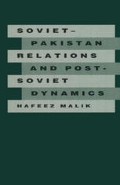Abstract
The nature of the relationship between a superpower and a regional state is always asymmetrical; this inequality reflects itself most glaringly when the instruments of their diplomacy and self-projection are evaluated. For the Soviet Union, Marxism-Leninism and the foreign communist parties since 1917, were formidable tools in the conduct of its foreign policy both toward the West and the Islamic East. Contrary to general impression, Muslim states were vulnerable to the lure of Marxist ideology, while they also endeavoured to use Islam against socialism with a fair degree of success.
Access this chapter
Tax calculation will be finalised at checkout
Purchases are for personal use only
Preview
Unable to display preview. Download preview PDF.
Notes
2-oy s’yeed Kommunisti cheskovo Internatisionaka (Moscow, 1929), pp. 562–5 in Hugh Seton-Watson, From Lenin to Malenkov (New York, 1953), pp. 73–4.
Sayyid Sulaiman Nadwi, Khilafat Awr Hindustan in Ma’arif (Azam-garh: October, 1921), pp. 139–99; Abdul Halim Sharar, Tarikh-i Khilafat (Lucknow: 1928), pp. 15–19.
Among the Caliphate leaders, Mawlana Abdul Bari and Abul Kalam Azad issued the fatwa for the migration of the Muslims out of India. For the text of Azad’s fatwa see, ‘Hijrat Ka Fatwa’, Daily Ahl-i Hadith (Amritsar: 30 July 1920); also, Hafeez Malik, Moslem Nationalism in India and Pakistan (Washington, DC: 1963), pp. 343–4.
F. S. Briggs, ‘The Indian Hijrat of 1920’, The Muslim World (Hartford: Vol. XX, no. 2, April 1930), pp. 164–8.
Cf. Muzaffar Ahmad, The Communist Party of India and Its Formation Abroad (Calcutta: 1962), pp. 32–3;
see also Gene G. Overstreet and Marshall Windmiller, Communism In India (Berkeley, 1960), pp. 26–7.
Muhammad Sarwar, Afadat Wa Malfuzat Mawlana Obaid Allah Sindhi (Lahore: 1972), p. 296.
For the full text of this declaration and appeal see Iver Spector, The Soviet Union and the Muslim World, 1917–1956 (Seattle: 1956), pp. 15–16.
Sajjad Zaheer, A Case for Congress-League Unity (Bombay: 1944), pp. 20, 36.
N. K. Krishnan (ed.), Forgery Versus Facts: Communist Party Exposes the Fifth Column (Bombay, 1948), p. 19.
N. K. Krishnan (ed.), National Unity for the Defence of the Motherland (Bombay: 1943), pp. 24–5.
Sajjad Zaheer, Roshnai (Lahore: Maktabu-i Urdu, 1956) See Harf-i Akhar.
Pakistan Kammunist Parti, Inqalabi Discipline Kaya Hai (Lahore: 1950), p. 4.
Zaheer, Roshnai, pp. 114–15; Muhammad Sadiq, Twentieth Century Urdu Literature (Baroda: 1947), p. 61.
Faiz Ahmad Faiz, Mizan (Lahore: Nashrin, n.d.), pp. 244–5; for a general critical appreciation of Prem Chand, see also Mumtaz Husain, Adab Awr Sha’ur (Karachi: 1961), chapter on ‘Novel Nigar Munshi Prem Chand’, pp. 253–84.
P. C. Gupta, A Handful of Wheat and Other Stories of Prem Chand (New Delhi: 1962), pp. VI–VII.
A very slight amendment in the wording of the Manifesto was adopted on the suggestion of the Maharashtra delegation. Cf. Zaheer, op. cit., pp. 114–15; Sadiq, op. cit., p. 62; see also a highly critical study by Gopal Mital, Adab Mein Traqqi Pasandi (Delhi: 1958), p. 20.
Faiz Ahmad Faiz, Dast-i Saba (Lahore: 1952), p. 18.
Sahba Lucknavi (ed.), Majaz Ayk Ahang (Karachi: 1956), p. 684.
Cf. also Khawaja Ahmad Abbas, ‘Notes on Urdu Literature’, Journal of the Indo-Soviet Cultural Society (Bombay: January 1954), Vol. I, no. 1, p. 91.
Since 1937, when he made his debut in the literary circles of Lahore, Krishan Chandar has written about eight novels, and approximately 250 short stories, all of them in Urdu. A sizeable number have been translated into Sindi, Gujarati, Marathi, Polish, Chinese, Czech and Russian. Among the most outstanding of Krishan Chandar’s works are: Kala Bhangi (Kalu, The Sweeper); Maha Lakshmi ka pul (Maha Lakshmis Bridge); Peshawar Express; But Jagte Hal in (Idols Awake); Kahani Ki Kahani (Story of Story); and Brahma Putra. Ali Sardar Jafri, Taraqi Pashand Adab (Aligarh: 1957), p. 251.
An accomplished novelist and a historian, Aziz Ahmad later became Professor at Toronto University’s Department of Near East and Islamic Studies. For his generally sympathetic treatment of the Progressive Writers’ Movement, see Aziz Ahmad, Taraqi Pasand Adab (Delhi: 1945).
Hameed Arthan, Minhas, ed. and publisher, Soviet Union Awr Pakistan: Ta’wan Kay Tiys Sal (Rawalpindi: 1978), p. 30.
Author information
Authors and Affiliations
Copyright information
© 1994 Hafeez Malik
About this chapter
Cite this chapter
Malik, H. (1994). Instruments of Soviet Diplomacy and Self-Projection. In: Soviet-Pakistan Relations and Post-Soviet Dynamics, 1947–92. Palgrave Macmillan, London. https://doi.org/10.1007/978-1-349-10573-1_2
Download citation
DOI: https://doi.org/10.1007/978-1-349-10573-1_2
Publisher Name: Palgrave Macmillan, London
Print ISBN: 978-1-349-10575-5
Online ISBN: 978-1-349-10573-1
eBook Packages: Palgrave Political & Intern. Studies CollectionPolitical Science and International Studies (R0)

